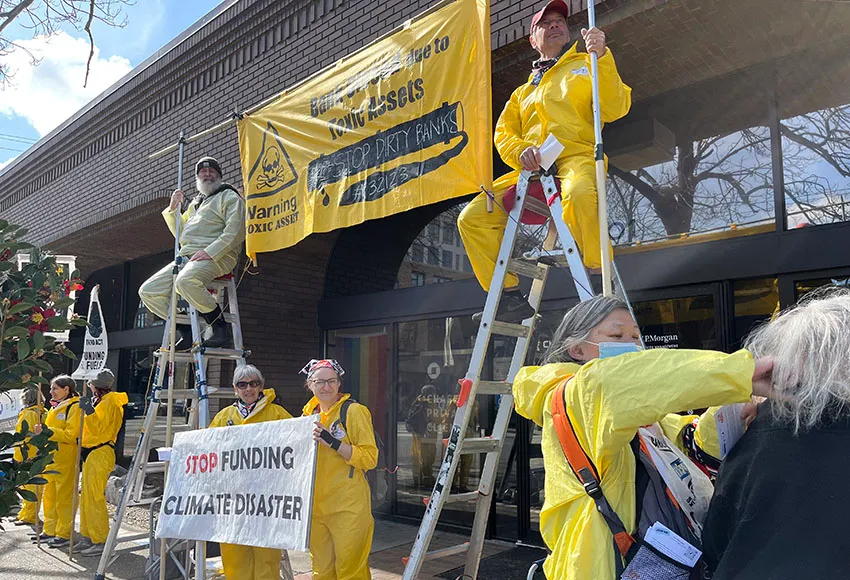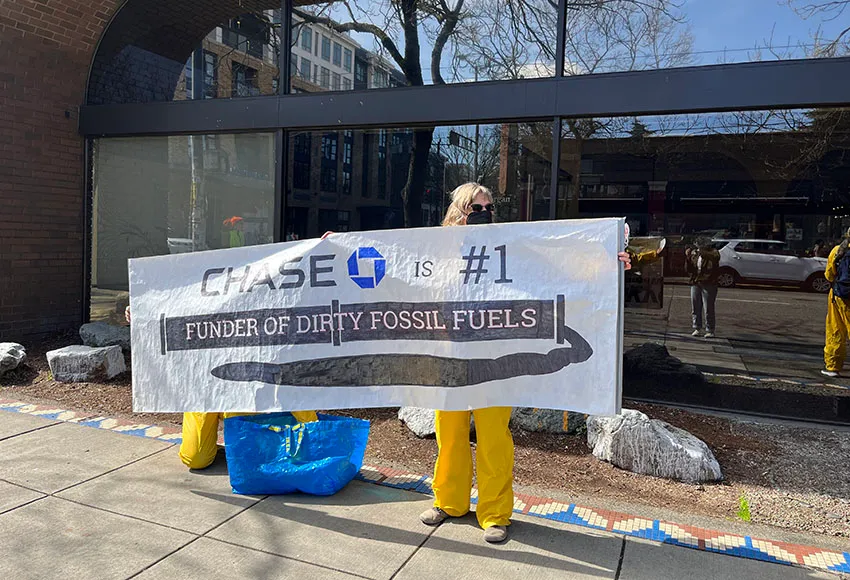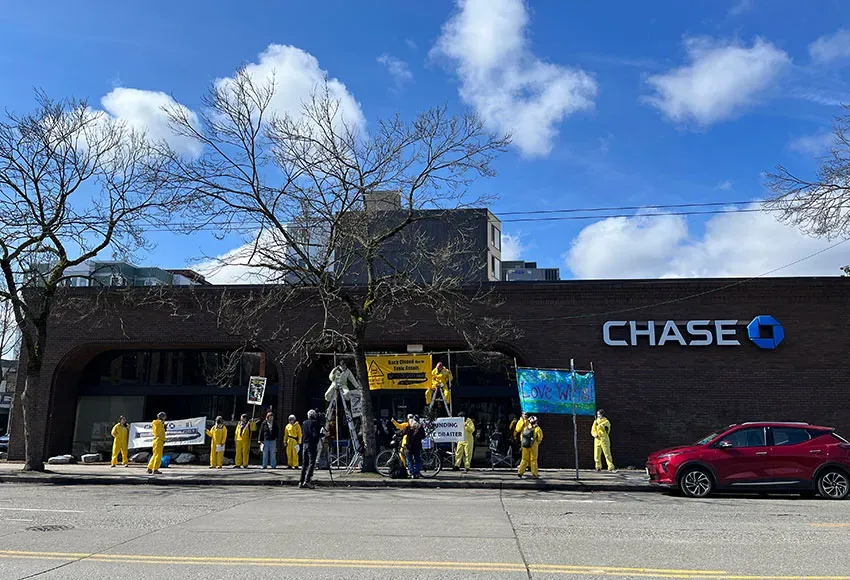Chants of "Sound the alarm!" could be heard up and down Broadway on the afternoon of Tuesday, March 21. Decked out in yellow jumpsuits, climate activists took to the streets to remind residents in Capitol Hill of the impending climate crisis and to call on some of the country's largest fossil fuel investors to implement changes.
The protest was organized by Third Act, Stop the Money Pipeline, and 350 Seattle.

Chasing a cause
While a large group marched up Broadway with signs and chanting, a smaller group stationed themselves in front of the neighborhood's Chase Bank.
"We are here protesting banks financing fossil fuel," Akiksha Chatterja told the SGN. Stationed right outside the front doors, she held up a large blue and green painted banner that read "Love Wins!"
"Chase is one of the biggest financiers of fossil fuels globally," Chatterja explained. "We are here showing them we want climate justice."
No more than 20 minutes after protesters had set up in front of the bank, uniformed security guards arrived, instructing them to move away from the bank's entrance to prevent the disruption of business.
Disrupting Chase Bank's business was all a part of the plan, however.
"Part of the action is to get customers of these banks to cut ties with them and stop banking with them," Chatterja explained. "A big part of this action is to cut up your cards and stop banking with the dirty banks. Move your money."
Latest IPCC report: climate change is getting worse
Seattle's protest follows the latest Intergovernmental Panel on Climate Change report. The IPCC is a global body dedicated to assessing climate change, like an environmentally focused United Nations. This month, the organization released its Synthesis Report, which compiles climate data collected over the last seven years.
Like most reports released by the IPCC, the Synthesis Report is not great. It shows that climate change is continuing to worsen. The report confirmed that greenhouse gas emissions have continued to rise at record levels. Global temperatures were recorded at 1.1 degrees Celsius above preindustrial levels. Scientists now predict temperatures will reach +1.5 degrees C by the early 2030s.
At the 2023 IPCC meeting, scientists and global leaders started shifting conversations toward ways humanity can adapt to a rapidly changing climate. One point brought up at the meeting was that people in underdeveloped nations, who have contributed the least amount of global emissions, are likely to be the most impacted by the increase in natural disasters caused by climate change.
Representatives from developing countries are now calling on rich nations to provide financial compensation to help them prepare for an onslaught of natural disasters. While many have agreed, the financing is still nowhere near the goal.
The IPCC report also found that the ongoing climate crisis has already created intergenerational inequalities. Children born in this decade will suffer more climate disasters than their parents or grandparents. The report also linked climate change to the lowering global birth rate. Major climate disasters have led to higher rates of infertility, and the risk of greater danger has led many people between the ages of 20-40 to report actively choosing to remain child-free.
Finding hope
While the IPCC report may seem bleak, contributing scientists also found a reason for hope. They believe we have not passed the point of no return yet. If global gas emissions can decline by 21% in the next decade, and continue to decline to 35% by 2035, then we can keep the global temperature from rising above 2 degrees C. To achieve this goal, the world needs to see serious emissions reductions.
Reducing emissions by such a large amount may be difficult, but the IPCC says it's possible. Already, they are reporting that recent shifts in laws, technologies, and global policies have reduced emissions by several billion tons. This shift toward reduction in emissions is due to the tireless work of activists and scientists who have continued to push climate change conversations to the forefront.

Knowing that they can make a difference is one of the reasons protesters took to the streets in Seattle.
"These banks didn't have any policies on climate or fossil fuels just a few years ago. These actions have worked," Chatterja said. "Our pressure is working, and banks need to step up."
Seattle's protesters were also inspired by global movements that have effectively persuaded large banks to defer funds from fossil fuels.
"Chase is the number one funder of fossil fuels," protester Margo Polly said. "In December, HBC [Hudson's Bay Company] in Europe agreed to defund all their fossil fuel projects. Chase is now the biggest funder. They are not getting the message."
"We should all be terrified for the planet today"
Chase Bank has been the target of many climate activist protests over the last few years. While other organizations have listened to activists, Chase is still refusing to take action.
"[Chase] is still funding fossil fuel expansion projects, which we know, based on all scientific reports, are incompatible with the 1.5-degree pathway," Chatterja explained. "[Chase Chief Executive Officer] Jamie Dimon has even been on record saying that if they stopped financing fossil fuel expansion, it would be a 'road to hell' for America, which is saying we're still gonna finance fossil fuel projects and torch the planet."
Seattle's protesters aren't just targeting Chase. "We're trying to get the message through to Chase Bank, Bank of America, Wells Fargo, and Citibank, too. They cannot do this," Polly said. "Climate change is terrifying. If people start to look into the science and the feedback groups, we should all be terrified for the planet today. We don't know what our future is going to look like. We are compelled to be here to try and explain the urgency of the crisis."
Spurred on by hope and a determination to save the world, these climate activists have no plans of quitting. Third Act officially named March 21 "Stop Dirty Banks Day." 350 Seattle is working to include youth in the national climate strike movement, calling on all students to join in a protest on March 25 at 4 p.m. and support the Building Emissions Performance Standards policy currently being proposed to the City.
Together, we can all make a difference. All are welcome to show up, show support, and show corporations that the planet matters more than profits.


